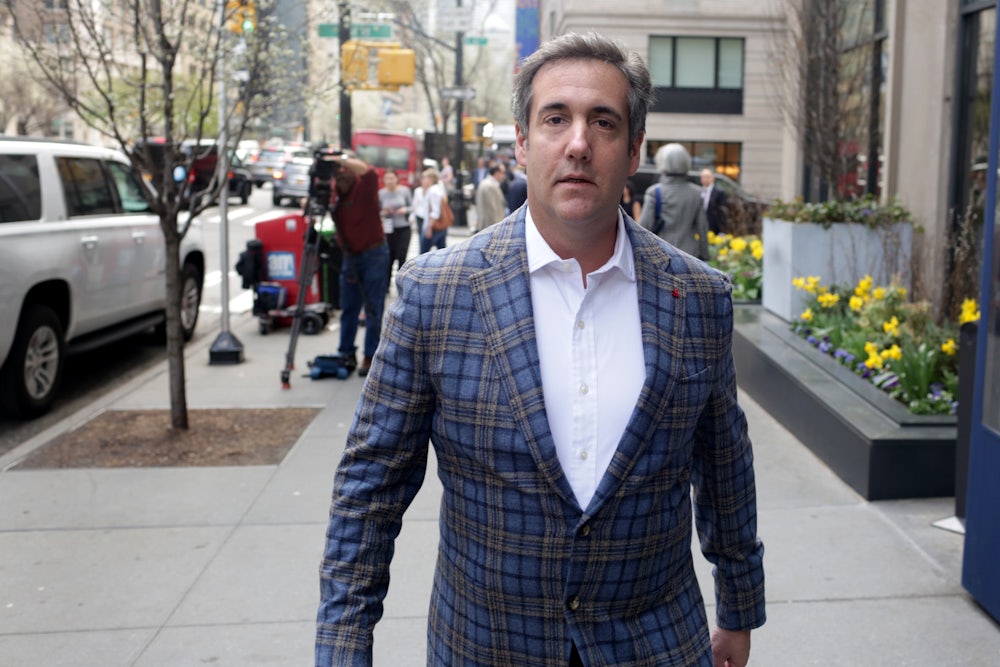When he’s not acting as the president’s personal attorney and longtime fixer, Michael Cohen is apparently a deeply insightful observer of business and politics. Why else would Fortune 500 companies and an investment firm with close ties to a Russian oligarch pour hundreds of thousands of dollars in “consulting fees” into a shell company he owns, as recent documents show?
AT&T, Novartis, and Korea Airspace Limited all admitted to paying Essential Consultants, an LLC created by Cohen, between $150,000 and $400,000 over the past year, but the most eye-opening client was Columbus Nova, an investment firm that paid the LLC $500,000 last year for his services “as a business consultant regarding potential sources of capital and potential investments in real estate and other ventures,” the company told The Wall Street Journal. Columbus Nova is run by an American cousin of Viktor Vekselberg, who is one of Russia’s wealthiest men and has a working relationship with Russian President Vladimir Putin; its top client is the Renova Group, a conglomerate controlled by Vekselberg.
The payment from Columbus Nova appears to be the first confirmed financial exchange between a Russian oligarch and a member of Trump’s inner circle since he became the Republican nominee in 2016. Why, then, did the Justice Department separate the Cohen case from the Russia investigation?
The details about the payments to Essential Consultants became public courtesy of Michael Avenatti, the media-savvy lawyer for adult-film actress Stephanie Clifford, whose stage name is Stormy Daniels. Clifford is suing Cohen over a $130,000 agreement she made with him, shortly before the 2016 election, to keep quiet about her alleged affair with Trump in 2006. Cohen paid her the hush money through Essential Consultants, and was reimbursed by Trump through a monthly retainer. A federal judge in Los Angeles put Clifford’s lawsuit on hold last month in anticipation of Cohen’s likely indictment by federal prosecutors in Manhattan.
Despite that freeze, Avenatti remains a constant cable-news presence and thorn in the White House’s side. He isn’t a neutral party in this story, of course, and has a clear interest in framing the payments as negatively for Cohen as he can. (Cohen’s lawyer Steve Ryan confirmed the transactions to The Atlantic, but disputed the description of them as “payments.”) Nonetheless, the transactions’ mere existence raises serious questions for Cohen and for the president.
The AT&T and Novartis payments, for example, could appear improper when placed alongside both companies’ interactions with the Trump administration. The telecommunications giant paid Cohen $200,000 in monthly $50,000 installments through December 2017, roughly the same time that the Justice Department filed an antitrust lawsuit to block the company’s purchase of Time Warner. Trump had frequently criticized the deal in the months before the lawsuit.
Novartis, one of the world’s largest pharmaceutical companies, also paid Cohen for his consulting advice “focused on U.S. healthcare policy matters,” the company said. According to USA Today, Trump held a meeting with European business leaders that included Novartis’s then-CEO Vasant Narasimhan only days after the final payment was made to Cohen. The company said it was questioned about the payments last year by Robert Mueller, the special counsel leading the investigation into Russian interference in the 2016 election.
The Vekselberg connection also sheds new light on what had been a curious episode in the Russia probe. Federal investigators working for Mueller searched Vekselberg’s plane and personal devices when he landed at a U.S. airport in March. Though that search became public knowledge in recent weeks, it wasn’t until Tuesday that CNN reported that Vekselberg himself was questioned about the payment to Cohen. One month after the search, Vekselberg and the Renova Group were among the Russian officials and business leaders hit with sanctions by Trump’s Treasury Department.
Two questions remain. First, how did Avenatti learn all this? As I noted earlier, his client’s lawsuit against Cohen is currently on hold. The two sides hadn’t yet reached the discovery stage, meaning Avenatti wouldn’t have access to Cohen’s internal documents on his own. The details Avenatti provided also can’t be acquired through public means and, unlike Mueller, he doesn’t have the power to compel banks or ask financial regulators to hand it over.
Second, why did Deputy Attorney General Rod Rosenstein transfer the Cohen case to federal prosecutors in Manhattan? The referral from the special counsel’s office seemed to indicate that whatever Mueller had uncovered wasn’t strictly related to his investigation, and yet the documents revealed by Avenatti show a clear connection between the Trump world (Cohen) and Moscow (Vekselberg). So either Mueller didn’t know about this connection, which seems highly unlikely, or he didn’t find it compelling enough to warrant keeping the Cohen case under his control. Nonetheless, Cohen and Trump are still facing a two-front battle against the Justice Department.
